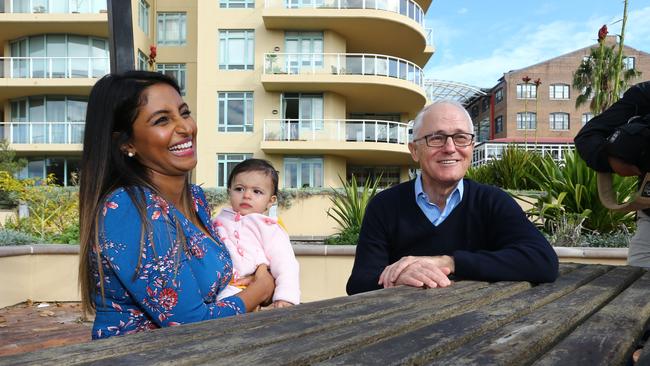Business backs Albo’s vision for Labor’s future
Business leaders have hailed Anthony Albanese’s vision for closer engagement between Labor and corporate Australia.

Business leaders have hailed Anthony Albanese’s vision for closer engagement and less division between Labor and corporate Australia as Malcolm Turnbull argued a split was opening in ALP ranks over Bill Shorten’s rejection of corporate and personal income tax cuts.
Australian Industry Group chief executive Innes Willox welcomed a speech by Mr Albanese in which he stressed the need for Labor and business to have a good relationship, saying some in the labour movement “are very much on the divisive path”.
In his Whitlam Oration on Friday night, Mr Albanese appeared to lay out his own blueprint for a future Labor government in a repudiation of Mr Shorten’s fierce anti-business campaign just a month out from the Super Saturday by-elections on July 28.
The Prime Minister yesterday moved to stoke Labor leadership tensions ahead of the by-elections.
He argued that Mr Albanese had called out the Labor Party for turning its back on the legacy of Bob Hawke, who Mr Turnbull said had designed policies aimed at encouraging aspiration so Australian workers could “get ahead”.
“They (Labor) want to have higher taxes on businesses, on families. They want to have higher taxes on investment,” Mr Turnbull said.
“No wonder Anthony Albanese is criticising it. I mean he must be just tearing his hair out to see the way Bill Shorten is abandoning literally years of, of what the Labor Party used to stand for.
“Their anti-business agenda is one that is starting to tear the Labor Party apart.”
As a poll by the left-leaning Australia Institute think tank showed Labor struggling to hold the northern Brisbane seat of Longman and locked in a dead heat with the government, the Opposition Leader dismissed suggestions there was anything in Mr Albanese’s speech on Friday that caused him “any offence at all”.
He said he had received a copy of the speech before it was delivered and was unconcerned by its message. “I encourage my members of the united Labor team to put forward their views on the fair go. I want a fair go for everyone and I think that’s what was motivating Anthony’s talk as well,” he said.
Asked whether he and Mr Albanese had spoken since Friday, Mr Shorten said: “Yes, we had an amicable chat. He said he thought (the reaction to the speech) was overblown and I agreed with him.”
Mr Willox said he backed Mr Albanese’s speech. “There are some in the labour movement — which is not to say the Labor Party — who are very much on the divisive path … That is just going to lead to division and hurt the economy. I thought it was a good speech and a recognition that Labor needs to have a good relationship with business and business needs to have a good relationship with Labor.”
Australian Chamber of Commerce and Industry chief executive James Pearson said Mr Albanese was “right to recognise” that the level of unionisation had decreased dramatically.
“It’s important that any party which aspires to government recognises the importance of business,” he said. “There is no economy without a strong business sector and it’s important that the Labor Party recognises that in order to create jobs and provide people with the living standards and opportunities to which they aspire.”
Business Council of Australia chief executive Jennifer Westacott said she encouraged “all sides of politics to work with business constructively”.
“Business, after all, is the engine room of the economy,” she said. “When business thrives, Australia thrives.”
Union leaders rallied behind Mr Shorten’s leadership yesterday, rejecting suggestions his job was in the firing line if he underperformed at the five by-elections due next month.
Transport Workers Union national secretary Tony Sheldon, a key union figure in the NSW Right, said Mr Shorten’s leadership was “clearly safe”.
The Construction Forestry Maritime Mining and Energy Union confirmed that Mr Albanese and Mr Shorten had told the union in writing in 2013 they supported the abolition of the Australian Building and Construction Commission. The Coalition has repeatedly accused Mr Shorten of having a “secret deal” with the CFMMEU, which backed him as leader over Mr Albanese.
During the leadership contest in 2013, the union wrote to Mr Shorten and Mr Albanese, seeking their position on a range of issues, including the future of the ABCC.
Liberal MPs often highlight Mr Shorten’s reply that he was committed to opposing the reintroduction of the ABCC. Union figures said Mr Shorten’s letter was being “peddled by certain people in the Labor Party” to try to undermine him.
But Dave Noonan, of the CFMMEU, confirmed Mr Albanese had made a similar commitment to the union in 2013.





To join the conversation, please log in. Don't have an account? Register
Join the conversation, you are commenting as Logout